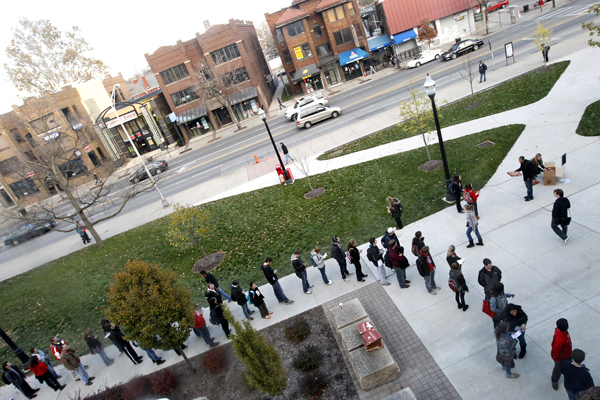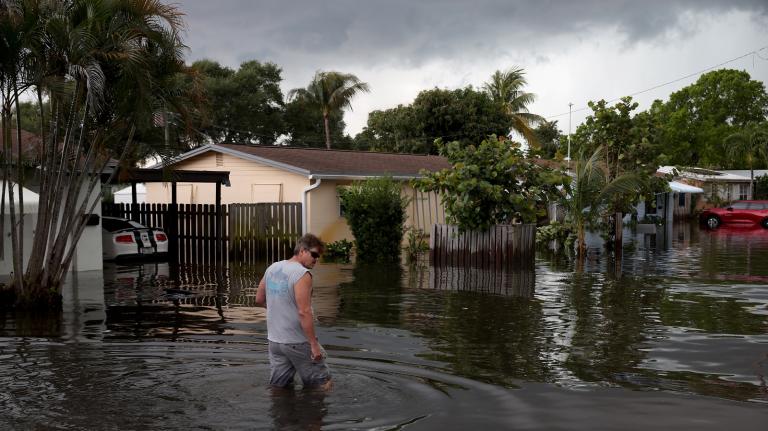It’s here at last — the day we’ve all been waiting for. The day when, with any luck, this overhyped, overadvertised, overanalyzed electoral circus will finally end and we can all go back to looking for work and trying to save the planet from the boneheads we elect to run the place.
So, you might ask, which races will Grist’s urban experts be watching most closely today? Here’s a quick list of races that we believe will have the biggest impact on U.S. cities – both individually and collectively. Know of others? By all means, comment below or tell us via Facebook or Twitter. We’ll be watching every tweet and biting our nails.
The highest office in the land
Cities have gotten about as much love from the presidential candidates this year as the climate (read: zilch), but the stakes are high nonetheless.
President Obama has made limited headway on urban issues, as with many things. But nonetheless, under his hand, key federal agencies have begun to turn their focus away from subsidizing suburban sprawl and toward reviving our urban neighborhoods. He understands that the deck is stacked against poor, inner-city kids and he has pushed initiatives and policy proposals that would help give them a fair chance.
What little Mitt Romney has offered us in terms of an urban policy agenda does not inspire confidence. His “47 percent” speech probably gives us all we need to know. To his credit, he backed pioneering smart-growth policies as governor of Massachusetts — but this is a man who has never let the past get in the way of things. At another private fundraiser last spring, he suggested that he might do away with the Department of Housing and Urban Development — an agency that his father once headed.
Mr. Shrink-the-city
There is at least one guy who hasn’t been afraid to talk about giving U.S. cities a leg up this election season. Dan Kildee, a shoo-in for the House of Representatives for Michigan’s fifth congressional district, is best known as the leader of the “shrink the city” movement, a cadre of city planners and academics who argue that the best way to save shriveling manufacturing towns is to bulldoze abandoned neighborhoods to make way for parks and urban gardens — and new development when the economic tide turns. He’s put these ideas to work in and around Flint, Mich., as the longtime treasurer of Genesee County.
“There’s a mythology that if you live near a city but not in it, you’re OK if the city fails,” he told me earlier this year. “It’s like thinking that if you’re on a boat and there’s a hole at the other end, you’re not going to sink. You’re going down with the ship.”
Los Angeles’ train tax
More than a dozen transit-related initiatives will appear on local ballots today, including a measure in Orange County, N.C., that would add a half cent to the sales tax to fund transit, and one in Memphis that would increase the cost of a gallon of gas by a penny, raising an estimated $3 million to $6 million each year for the Memphis Area Transit Authority.
The big kahuna, however, is Los Angeles, where four years ago voters approved Measure R, a sales tax increase that is expected to raise $40 billion over 30 years for transit, highway, and bus projects. Measure J, which appears on the ballot today, would extend the transportation tax another 30 years.
Putting a long-term transit tax in place would allow L.A.’s Metro to borrow the money now and pay it off over the coming decades, meaning that Angelenos could be living in traintopia in the not too distant future. Under California law, the measure will require a supermajority of at least two-thirds support to pass, but that didn’t stop Measure R from passing in 2008.
New leadership in Portlandia
While there are not a lot of big mayoral races this year, Portland will replace Sam Adams, who made history four years ago when he became the first openly gay candidate to win the top seat in any major U.S. city. (Adams also makes regular appearances on Portlandia, playing the part of a mayor’s assistant.) The race pits longtime City Commissioner Charlie Hales against state legislator Jefferson Smith. The winner will inherit what the Oregonian calls “a hole-riddled city budget, a long to-do list and a City Council possibly unsettled by one of the biggest election-year shakeups in 60 years.”
The shakeup? Portlanders will fill a seat on the city council, choosing between two women who have both headed city environment agencies, and, according to the Oregonian, also hail from Southwest Portland, drive cars with vanity license plates, and share liberal leanings. The difference? “The candidates probably couldn’t be further apart in style.” I can feel that earth shaking now.
Thirsty California cities
Two California burgs will vote on measures regarding their water supplies, and the environmental impacts that come along with keeping the wet stuff running from their taps. Both offer hints of the tradeoffs we’ll make to keep our cities running in a climate-changed world.
San Francisco voters will decide today on a ballot initiative that would create a task force to examine the city’s water system, including the dam that flooded the Hetch Hetchy Valley in Yosemite almost a century ago. Environmentalists have long campaigned to drain the reservoir and restore the valley. If voters approve Proposition F, that dream could be one step closer to reality. Supporters say the miracles of modern engineering could provide the city with water even without the dam, but California is epically short on water, and forecasts for warmer winters and reduced snowmelt make for a grim prognosis. San Francisco Mayor Ed Lee has called the proposal “insane.”
In Santa Cruz, city residents are concerned about water as well — only there, the issue is not dams, but a proposed desalination plant that would take the salt out of seawater and make it usable for drinking. What could be objectionable about that, you wonder? There’s the $123 million price tag, for starters — and think of all those tiny little sea creatures that will die! Measure P would prevent city officials from approving such a plant without first taking it to a popular vote.
UPDATE:
How could we have forgotten? Voters in Grist’s hometown of Seattle decide today whether to approve $290 million in bonds to replace the decrepit seawall that holds back the waters of Elliott Bay — and holds up the touristy waterfront. This simulation video shows what would happen if a magnitude 7.0 earthquake hit the city:
The seawall effectively turns to mush and the elevated freeway running along the waterfront falls to pieces. The video also notes “extensive damage to older buildings” downtown (gulp, that’s us), but good news: “No tsunami expected.”
UPDATE:
The Atlantic Cities has a couple of good pieces about cities and elections today.
Henry Grabar has a good roundup of Conressional races that have serious implications for American cities. “Congressional races with a bearing on urban policy can be split into three categories,” he writes – “safe races for urban advocates (all Democrats), vulnerable GOP freshmen who have sought to make a name for themselves by cutting funding wherever they see it, and one rather important toss-up between two long-serving legislators.”
The “tossup” is a biggie – the race between Republican Congressman Tom Latham, who once mocked Transportation Secretary Ray Lahood’s calls for more bike lanes (and also happens to have his hands on the purse strings for transportation funding), and Leonard Boswell, who Grabar says has been “a rank-and-file Democrat on issues of infrastructure spending, bringing home stimulus money to fund mass transit improvements in Des Moines.”
And if it’s the presidential race you care about, Emily Badger has a good piece about how a handful of cities in swing states could decide the election:
There’s little question President Obama will take Cleveland, Milwaukee, and Denver. But the question is: by how many votes? Will Obama’s support in these urban centers be enough to land the president crucial electoral college votes in swing states otherwise heavily painted red? Or will urban turnout dip far below 2008, tipping some states toward Republican Mitt Romney?





